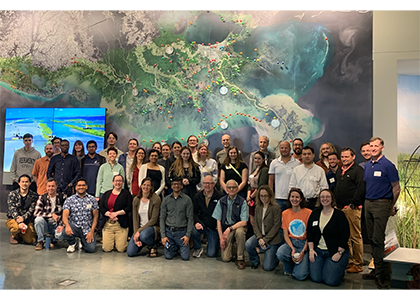The Leaky Deltas OCB workshop was held 17-20 March 2025 at Louisiana State University, in Baton Rouge, USA, which is situated within the Mississippi River delta. We brought together 57 members of the research community who study river deltas in the context of the global carbon cycle. The goal of the workshop was to create a community consensus on the state of delta carbon cycle science, identify critical knowledge gaps, and brainstorm opportunities and priorities for future research efforts. Participants ranged in career stage from graduate student to senior scientist, and from disciplines ranging from biogeochemistry to geomorphology, river scientists to oceanographers; and scientists using a variety of methodological approaches.
The workshop included five oral sessions, four breakout sessions, numerous opportunities for discussion over meals and coffee breaks, a trip to the LSU Center for River Studies, and a workshop dinner. The breakout sessions were formatted to encourage discussion among interdisciplinary groups of scientists at different career stages. During breakout session 1, participants were randomly assigned to groups that spanned career stages and expertise. This session was aimed at identifying grand challenges in delta carbon cycle science. Breakout session 2 had a disciplinary focus, where we broke out into groups of biogeochemistry, geomorphology, modeling, and ecosystems. Breakout session 3 was broken out into groups based on physical domains of the delta: river, wetlands, subaqueous delta, shelf, and continental slope. A highlight of day three was a field trip to the LSU Center for River Studies, where workshop participants were guided on a tour of the historical changes of the Mississippi River Delta, as well as the large-scale physical model of the delta. On the fourth and final day of the workshop, we had short break-out sessions and reconvened as a whole to synthesize ideas and circle back to the workshop objectives.
In summary, the workshop resulted in a consensus on the key knowledge gaps and research grand challenges, which included constraining the composition of organic matter, the timescales of geomorphic processes, biogeochemical reaction rates, impacts of human perturbations and extreme events, and challenges in monitoring deltaic processes. Workshop participants now have the task of writing a position paper that summarizes these grand research challenges, identifies the data needed to address these challenges, and recommends a framework and directions for future research. One outcome of the workshop included the structure and organization for this paper. The early career workshop participants will also lead an early-career-led perspective paper that discusses ideas for integrating new technologies and methodologies to address these grand challenges and identifies future challenges for the delta science community.




